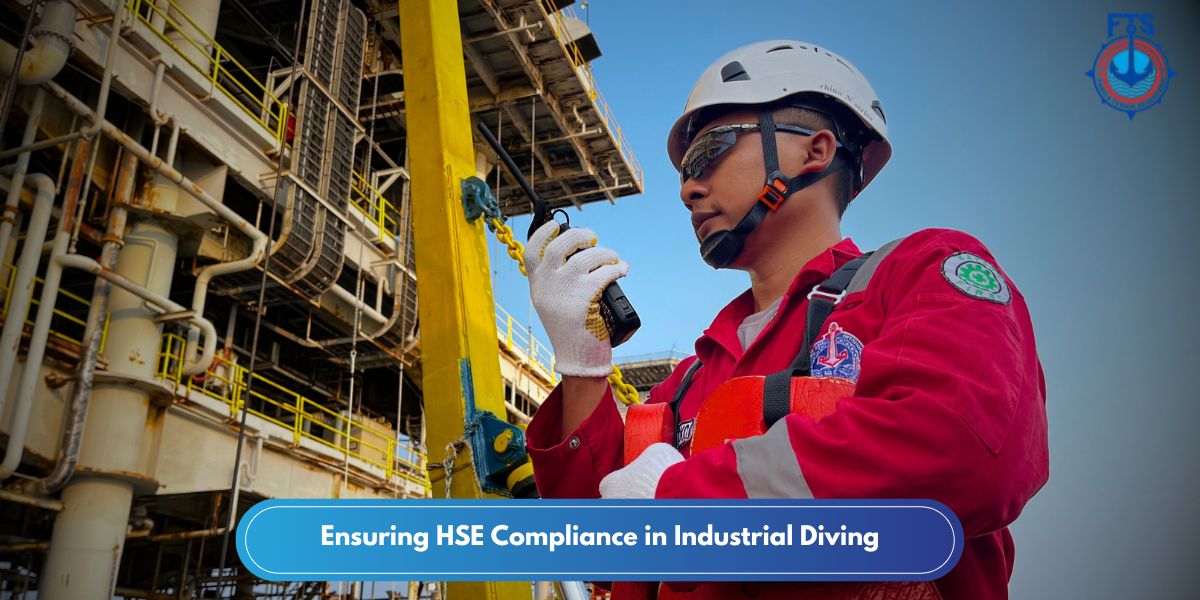Industrial diving is vital for subsea infrastructure maintenance in industries such as offshore oil and gas, marine construction, and renewable energy. These operations involve extreme environments that demand strict adherence to Health, Safety, and Environment (HSE) standards. Without compliance, risks such as equipment failure, diver injuries, or fatalities increase significantly. A strong HSE framework incorporating global safety regulations is essential for personnel safety and operational efficiency.
For expert consultation on diving projects, reaching out to an experienced subsea contractor is highly recommended.
Understanding HSE Regulations for Industrial Diving
Regulatory frameworks ensure diver safety through strict guidelines. Compliance with international and national regulations minimises risks and legal liabilities.
Key International Standards
- IMCA (International Marine Contractors Association) – Sets industry best practices, covering equipment specifications, diver training, and safety procedures.
- OSHA (Occupational Safety and Health Administration, US) – Regulates diving safety, medical surveillance, and emergency management.
- ADCI (Association of Diving Contractors International) – Establishes competency standards for commercial divers.
- HSE UK Diving Regulations – Governs risk assessments, supervision, and emergency response in the UK.
Regional Compliance Requirements
- Indonesia – Regulated by the Ministry of Manpower and the Directorate General of Oil and Gas (Migas), enforcing strict offshore safety laws.
- Singapore – Workplace Safety and Health Council (WSHC) and Maritime and Port Authority (MPA) oversee underwater construction regulations.
- Hong Kong – Marine Department mandates licensing for commercial divers.
- United States – OSHA and the US Coast Guard enforce strict safety protocols, particularly in offshore oil operations.
- Canada – Canadian Association of Diving Contractors (CADC) ensures compliance with CSA regulations for commercial diving.
Major Risks in Industrial Diving
Understanding hazards helps in implementing effective mitigation strategies.
- Decompression Sickness (DCS) & Barotrauma – Failure to follow decompression schedules can result in nitrogen buildup, causing serious medical conditions.
- Environmental Hazards – Low visibility, strong currents, cold water exposure, and hazardous marine life.
- Equipment Failures & Communication Issues – Malfunctions in umbilicals, gas supply systems, or communication breakdowns can lead to life-threatening situations.
Pre-Dive Safety Protocols
Preparation is essential for minimising operational risks and ensuring diver readiness.
- Medical Assessments – Divers must pass regular health screenings to confirm fitness.
- Pre-Dive Briefings – Operational plans, hazards, and emergency procedures must be clearly communicated.
- Equipment Inspections – Helmets, regulators, dry suits, and emergency bailout systems must undergo thorough checks before each dive.
Safe Diving Practices and Operations
Strict procedural compliance and real-time communication are crucial for operational safety.
- Supervised Diving Operations – Qualified Dive Supervisors oversee activities, with standby divers available.
- Underwater Communication – Hardwired/wireless systems facilitate coordination, with hand signals as backup.
- Worksite Safety Measures – ROVs enhance visibility, and buddy systems provide mutual support.
See also our HSE and Substance Policy.
Emergency Response & Incident Management
A robust emergency plan ensures swift intervention during critical situations.
- Evacuation & First Aid – Teams must have an emergency plan, with trained responders capable of administering oxygen therapy and CPR.
- Decompression Chambers – Must be available for deep diving operations to manage DCS.
- Incident Reporting – All accidents and near-misses must be documented and investigated to improve safety measures.
Conclusion
HSE compliance is non-negotiable in industrial diving. Adhering to international and regional safety standards ensures the protection of divers and the efficiency of subsea operations. Consulting a professional diving contractor for project-specific guidance is highly advisable to meet regulatory requirements and enhance operational safety.
For expert consultation on industrial diving solutions, contact us today to discuss your project needs.

